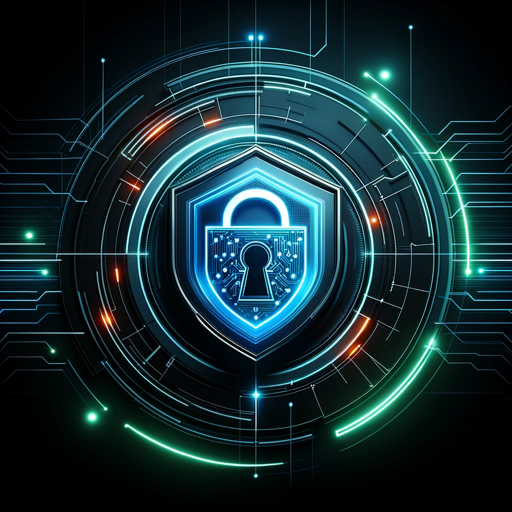Home Security-AI-powered home security guide
AI-powered insights for your home security
How can I improve my home's security?
What are the best home security systems?
How do I choose a security camera?
Can you explain smart locks?
Related Tools
Load More
Cyber security
Cyber security advisor for digital safety

Security Architect
An experienced security architect with over 20 years in security across all technology domains.

Cyber Security Tutor
Quality Cyber Security Advice, Tricks, & Tips
Web App Security / Penetration Test Strategies
It is a comprehensive methodology for testing the security of Web applications and Web services, and Bug Bounty. #OWASP #BurpSuite #ZAP #BugBounty #CTF Updated March 24, 2024

Network Systems Administrator and Security Expert
Bilingual network systems administrator and security expert

Cyber Guard
Cybersecurity advisor for home and small businesses. Ask any question or let cyber guard interview you.
20.0 / 5 (200 votes)
Understanding Home Security Systems
Home security systems are designed to protect residential properties from potential threats such as burglaries, fires, and other emergencies. The core functions of a home security system include monitoring, alerting, and sometimes actively responding to intrusions or dangers. These systems typically integrate various devices like cameras, motion detectors, door/window sensors, alarms, and control panels. They work together to create a network that ensures the safety of the home and its occupants. For example, when a door sensor detects unauthorized entry, the system can trigger an alarm, notify the homeowner via smartphone, and even alert a monitoring service that can dispatch emergency services if necessary.

Key Functions of Home Security Systems
Intrusion Detection
Example
Motion detectors and door/window sensors
Scenario
A homeowner installs sensors on all entry points (doors and windows). If an intruder attempts to enter through a window, the sensor triggers an alarm, and the homeowner receives a notification on their smartphone, allowing them to respond immediately.
Surveillance and Monitoring
Example
Security cameras with live feed and recording capabilities
Scenario
A family installs security cameras around their property. While on vacation, they can monitor live video feeds from their smartphones, ensuring their home remains secure. If they notice suspicious activity, they can contact the authorities directly.
Emergency Response
Example
Smoke detectors and carbon monoxide alarms
Scenario
A smoke detector integrated into the home security system detects a fire while the family is asleep. The system triggers an alarm to wake the occupants and automatically notifies the local fire department, ensuring a rapid response.
Target User Groups for Home Security Systems
Homeowners in High-Crime Areas
Individuals or families living in neighborhoods with higher crime rates benefit significantly from home security systems. These systems offer peace of mind by providing constant monitoring and quick alerts in case of any suspicious activity, helping to prevent burglaries and other crimes.
Frequent Travelers
People who travel frequently, whether for work or leisure, are prime candidates for home security systems. Remote monitoring and mobile alerts allow them to keep an eye on their property from anywhere in the world, ensuring their home is protected even when they are away.

Guidelines for Using Home Security
Step 1
Visit aichatonline.org for a free trial without login, no need for ChatGPT Plus.
Step 2
Familiarize yourself with the available features, including detailed security tips, system comparisons, and troubleshooting guidance.
Step 3
Input specific questions or scenarios related to home security, such as system installation, maintenance, or security best practices.
Step 4
Review the provided information, ensuring it aligns with your specific needs, and use the recommendations to enhance your home security setup.
Step 5
Explore additional resources like FAQs, user guides, and updates for ongoing education and security improvements.
Try other advanced and practical GPTs
adnan reayat
AI-powered tool for academic research and analysis.

ZAP
AI-powered automation for industrial control

Bartender's Buddy - Mixmaster Max
AI-driven mixology with a flair for storytelling

SLOSHED Sales Framework Creator
AI-Powered Sales Script Creation

Tell Me Your Design Idea or Upload one
AI-powered design ideas for everyone.

Storyboard Artist
AI-powered Storyboard Visualization Tool

Sitemap BOT
AI-powered website sitemap optimizer

算命看相(Fortune-telling and Physiognomy )
AI-powered insights for your life path

NBA文章翻译
AI-powered NBA article translator.

职业拆书人
AI-powered book deconstruction tool

🧮 CalculaTech lv4.3
AI-powered assistance for complex tasks

Killer Sales Message
AI-driven sales pitches that convert

- Maintenance
- Installation
- DIY Setup
- Smart Integration
- System Comparisons
Home Security Q&A
What types of home security systems can I learn about here?
You can explore various types of systems including burglar alarms, surveillance cameras, smart locks, and integrated security networks. Detailed comparisons and installation tips are also available.
Can I get advice on installing security systems myself?
Yes, you can receive step-by-step guidance on DIY installation, including tips on selecting the right locations for devices, wiring, and integrating with existing smart home systems.
Does this service offer information on maintaining security systems?
Absolutely, you can learn about routine maintenance, troubleshooting common issues, and ensuring that your system remains operational over time.
How can I enhance my home security beyond installing a system?
Beyond systems, you can receive advice on physical security enhancements like reinforced doors, window locks, and outdoor lighting, as well as safety protocols for your household.
Is there support for integrating home security with other smart devices?
Yes, you can find detailed guides on how to connect your security systems with other smart home devices, such as lights, thermostats, and voice assistants, for a seamless experience.